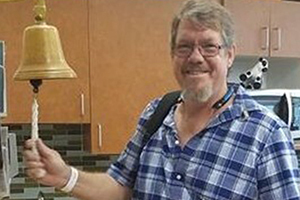01. Mesothelioma Remission
What Does Mesothelioma Remission Mean?
Mesothelioma remission is a reduction or disappearance of cancer signs and symptoms. It can be brief or long-term and is usually temporary in mesothelioma cases. In recent years, treatment advances have made remission more common among mesothelioma patients.
In general, mesothelioma remission occurs after aggressive multimodal treatment. Multimodal plans use more than one type of therapy to treat cancer. This approach may be the most effective way to improve mesothelioma prognosis.
If signs and symptoms reappear after a period of being undetectable, this is called recurrence.
Types of Mesothelioma Remission
Specialists generally categorize cancer remission into two types:
- Complete remission: Physicians consider cancer in complete remission when there is no discernable evidence of it. This means it does not show up on imaging scans, in blood work or during physical exams. Patients in remission also have no symptoms of cancer.
- Partial remission: Using imaging scans and blood tests, physicians consider two factors to determine if cancer is in partial remission. They confirm a minimum 50% reduction in post-treatment tumor size. And the tumors must appear to be stable (not growing).
Mesothelioma patients may experience complete or partial remission after treatment. Both types of remission are associated with improved conditions in patients.
Mesothelioma remission has happened with treatment. But some people may also have heard of spontaneous remission. This is a real phenomenon where cancer shrinks or disappears without treatment. But it is extremely rare, accounting for between 1 and 10 cancer cases in 1 million.
Researchers do not understand why spontaneous remission occurs. They continue to study it for clues into how to treat cancer.
Factors Linked to Mesothelioma Remission
Certain factors are linked to better chances of remission and longer periods before recurrence, including:
- Cell type: Mesothelioma cell type may affect remission in patients. One study compared remissions among patients with epithelioid and biphasic cell types. It linked epithelioid cells to a longer time between treatment and recurrence.
- Early diagnosis: In general, the earlier cancer is diagnosed and treated the better the chance of remission. For mesothelioma, early-stage diagnosis is associated with improved survival.
- Treatment eligibility: Certain mesothelioma therapies are associated with remission and longer times before recurrence. Eligible patients may experience remission after such treatments. For example, surgery plus hyperthermic intrathoracic chemotherapy (HITHOC) is linked to prolonged pleural mesothelioma remission.
Improvements in treatment also factor into remission among mesothelioma patients. For example, one study used gemcitabine, a chemotherapy drug, to treat pleural mesothelioma. It compared results to patients who only received post-chemo palliative care. The results showed much longer remission in patients who received gemcitabine.
02. Mesothelioma Recurrence
What Does Mesothelioma Recurrence Mean?
Mesothelioma recurrence is a return of the signs and symptoms of cancer after a period of being undetectable. It happens when, despite the success of initial treatment, not all cancer cells have been removed from a patient’s body. Over time, these cells can multiply, turning into cancer tumors that can cause mesothelioma symptoms.
Recurrent mesothelioma is common. Almost all mesothelioma patients whose cancer goes into remission later experience recurrence. Patients with recurrent mesothelioma have treatment options that can help improve post-recurrence survival.
Types of Mesothelioma Recurrence
Specialists may categorize recurrence using terms that describe how far the cancer has spread. Mesothelioma cancer patients may experience local or distant recurrence. The type may affect treatment options.
The following both describe returns of the signs and symptoms of mesothelioma after a period of it being undetectable:
- Distant recurrence: At least some of the recurrent cancer is found far from where the original cancer occurred.
- Local recurrence: The recurrent cancer is limited to the same area as or very close to the original cancer.
Mesothelioma patients whose cancer is in remission should have regular check-ups with their doctors. A mesothelioma oncologist can scan for signs of cancer recurrence. Early detection may improve treatment options and prognosis.
03. Treatments to Achieve Remission
Mesothelioma Treatments That May Lead to Remission
Studies link some mesothelioma treatments with better chances of remission. Researchers often combine treatments in the hopes of getting patients into remission. This multimodal approach may be the most effective way to improve survival. Doctors may combine surgery, chemotherapy, immunotherapy and other treatment types.
Patients may receive first- or second-line treatment with the goal of achieving remission. First-line is another word for initial. Second-line describes treatments given after the initial round.
First-Line Treatments That May Lead to Remission
Mesothelioma patients may receive different first-line treatments depending on their individual cases. Cancer stage, mesothelioma type, overall health and other factors affect treatment plans. It is important for patients to seek initial treatment at mesothelioma cancer centers. These centers have doctors experienced in treating this disease.
Several types of first-line treatments are associated with improved mesothelioma remission, including:
- Cytoreductive surgery plus HITHOC: Tumor-removal surgery plus this heated chemotherapy wash may help prolong remission. In one study, pleural patients who received this treatment averaged more than 27 months before recurrence. The group that did not receive this treatment averaged just under 13 months.
- Pleurectomy/decortication (P/D): P/D surgery may better prolong the time between treatment and recurrence than extended P/D (ePD). Both involve removing the lining around the lungs (pleura), but eP/D is more aggressive. One study found P/D patients had 26 months of recurrence-free survival compared to 15 months in eP/D patients.
Patients ineligible for mesothelioma surgery, or who have non-pleural mesothelioma, can discuss initial treatment options with their doctors. Experienced doctors can create individual treatment plans with the goal of cancer remission.
Second-Line Treatments for Pleural Mesothelioma Recurrence
Patients may receive additional rounds of treatment after pleural mesothelioma recurrence. According to experts, no standard treatment for recurrent pleural mesothelioma exists. Doctors use various second-line treatments depending on individuals’ unique cases.
Doctors have used the following to treat recurrent or progressive pleural mesothelioma:
- Chemotherapy: Chemotherapy drugs damage cancer cells while they divide. Alimta® (pemetrexed) with cisplatin is a common mesothelioma treatment. Doctors may use these or other chemo drugs for recurrent mesothelioma.
- Immunotherapy: Immunotherapy uses the immune system to fight cancer. In 2020, the U.S. Food and Drug Administration approved a combination of two immunotherapy drugs, Opdivo®+Yervoy®, to treat pleural mesothelioma.
- Targeted therapy: Targeted therapy attacks specific aspects of cancer cells. Oncology specialists may use these to attack certain mesothelioma cell types in recurrent patients.
Pleural mesothelioma patients have a median survival of about 8 months with older second-line treatments. However, breakthroughs in treatment may help improve remission and survival outcomes.
A recent study used immunotherapy to treat patients with inoperable pleural mesothelioma. Some patients who experienced recurrence received additional rounds of immunotherapy. These patients had a median survival of 26 months.
Second-Line Treatments for Peritoneal Mesothelioma Recurrence
Doctors have used the following to treat recurrent or progressive peritoneal mesothelioma:
- Chemotherapy: Doctors may use systemic or local chemotherapy as a second-line treatment for peritoneal mesothelioma. Systemic chemo circulates through the body’s bloodstream. Local chemo is confined to a specific location in the body.
- Immunotherapy: Doctors may use immune checkpoint inhibitors (ICIs) for recurrent peritoneal mesothelioma. ICIs help the immune system attack cancer cells. Peritoneal patients may receive Opdivo+Yervoy, two ICIs, as a second-line treatment. Another ICI, Keytruda®, has also seen positive results in treating recurrent peritoneal mesothelioma.
- Surgery plus heated chemotherapy: Doctors may use tumor-removing surgery plus HIPEC to treat recurrent peritoneal mesothelioma. HIPEC stands for heated intraperitoneal chemotherapy. Patients may receive one or more rounds of surgery plus HIPEC as a second-line treatment.
A study looked at peritoneal mesothelioma patients who underwent multiple rounds of tumor-removing surgery plus HIPEC. They had a median survival of 80 months. Patients who received a single round of this treatment had a median survival of 27.2 months.
Factors like type of recurrence, length of remission and patient health may affect treatment options.
Clinical Trials for Mesothelioma Remission
Clinical trials are studies conducted by medical experts to test new cancer treatments. These studies help doctors investigate and improve outcomes in patients. Some clinical trials look to improve remission length among patients after first-line treatment.
For example, an ongoing clinical study is looking at using an ICI to extend the time between surgery and recurrence. The trial involves patients with malignant pleural mesothelioma. It will compare outcomes among patients who receive the ICI Tecentriq® (atezolizumab) or a placebo after P/D surgery.
Patients interested in joining clinical trials can speak to their doctors. Mesothelioma doctors can consider ongoing trials and explain eligibility requirements.
Resources for Mesothelioma Patients
04. Mesothelioma Survivors in Remission
Mesothelioma Patients in Long-Term Remission
Remission can be brief or long-term. Long-term remission for mesothelioma is rare. But it does happen. Some mesothelioma survivors have lived for years with complete or partial remission. Improvements in treatment may help improve survival for a larger percentage of patients.
Long-Term Mesothelioma Survivors
Long-term mesothelioma remission is possible. Both pleural and peritoneal mesothelioma patients have experienced it. Several long-term survivors have lived for over a decade in remission. Survivors continue to share their stories with the mesothelioma community to provide hope to other patients.
Heather Von St. James

Heather Von St. James received a pleural mesothelioma diagnosis in 2005. She underwent surgery to remove cancerous tissues, followed by HITHOC. She also received post-surgery chemotherapy and radiation therapy.
Her mesothelioma has been in complete remission for more than 19 years.
Paul Cowley

Paul Cowley received a pleural mesothelioma diagnosis in 2012. Paul’s treatment plan involved surgery to remove mesothelioma tumors from his pleura and nearby tissues, plus chemotherapy.
His mesothelioma has been in partial remission for more than 10 years with no signs of progression.
Jim Dykstra

Jim Dykstra received a peritoneal mesothelioma diagnosis in 2013. He underwent cytoreductive surgery followed by HIPEC. He also received radiation, chemotherapy and immunotherapy.
He experienced a recurrence in 2020. After undergoing surgery and HIPEC again, he is back in remission.
05. Common Questions
Common Questions About Mesothelioma Remission and Recurrence
-
Does mesothelioma ever go into remission?
Yes, mesothelioma sometimes goes into remission. Remission is a reduction of cancer signs and symptoms in a patient. It may be complete or partial. Some survivors have also achieved remission again after cancer recurrence. Doctors can create individualized treatment plans to try to achieve remission.
-
Has anyone ever recovered from mesothelioma?
Some mesothelioma patients are long-term survivors. People like Heather Von St. James have lived more than a decade after diagnosis. Mesothelioma is considered incurable because of overall poor results. But some patients who have lived years past their initial prognosis may be considered “recovered.”
-
Can mesothelioma recur after remission?
Most mesothelioma that has gone into remission recurs. Patients who experience recurrence may receive additional treatment. This can result in another remission. It is important for patients in remission to go to follow-up doctor’s appointments to catch any signs of recurrence early.
-
Can lifestyle choices help with mesothelioma remission?
There is no evidence to suggest that lifestyle choices can help with remission. Patients may maintain certain diets, take supplements and explore alternative medicine as part of their cancer journeys. These may help them feel better and manage side effects. But they are not effective treatment substitutes.









